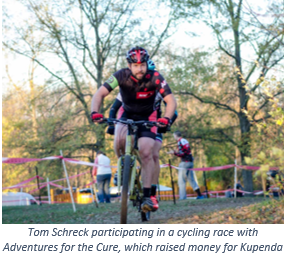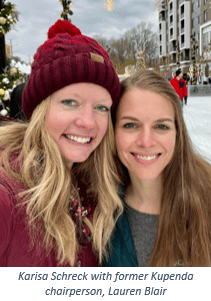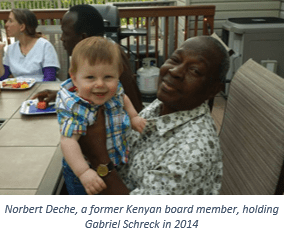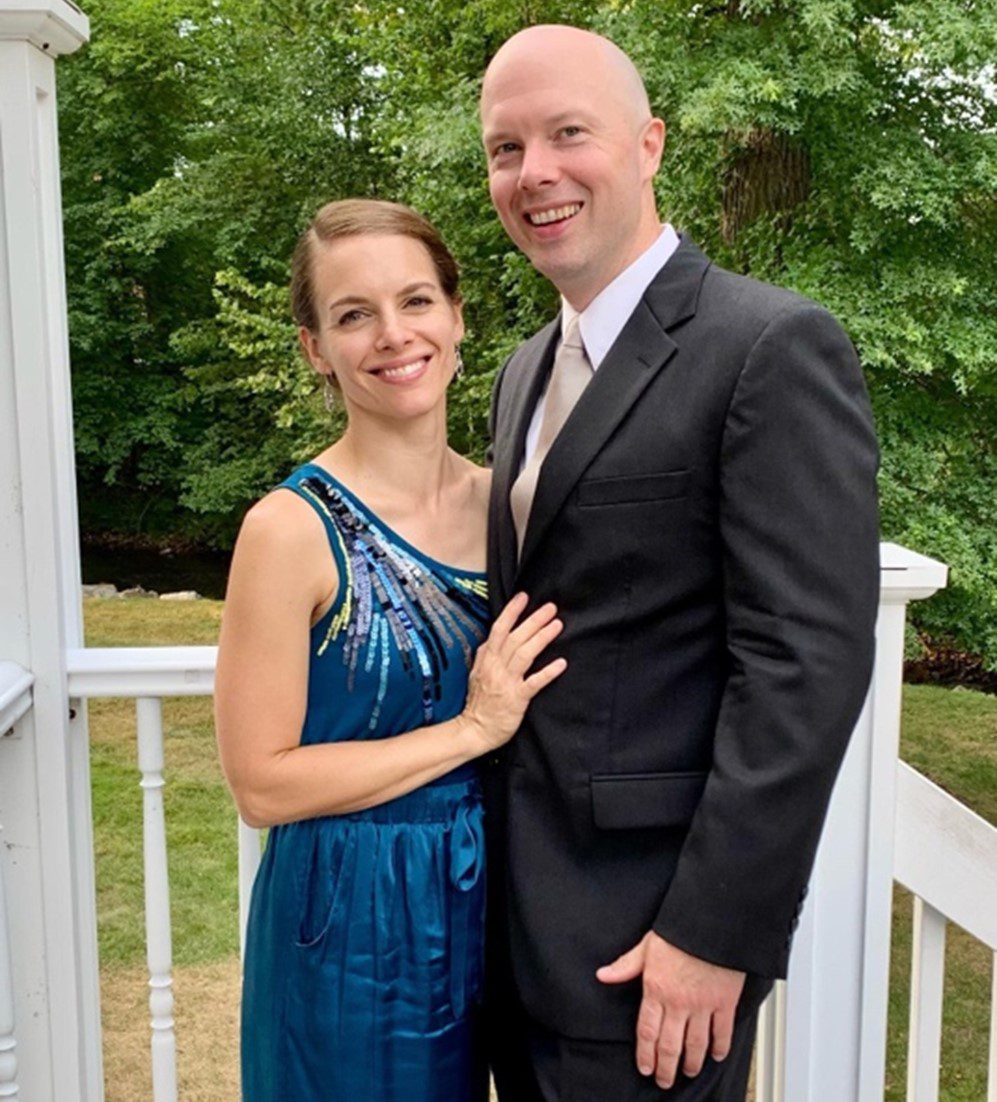Empowering Others to Serve: How Tom and Karisa Schreck View Their Long-Term Support of Kupenda’s Mission
by Lauren Blair
Posted on January 19, 2023
Beliefs, Child, disability, education, Health, International, marginalized, stigma, vulnerable
For the past 14 years, I have had the privilege of knowing and doing life with some of my dearest friends and neighbors, Tom and Karisa Schreck. Tom is a software engineer and former board member of one of Kupenda’s nonprofit supporters, Adventures for the Cure. Karisa is a neurologist at Johns Hopkins Hospital, who graciously shared her expertise with our Kenyan Executive Director, Leonard Mbonani, after he was diagnosed with non-Hodgkin’s follicular lymphoma.
Tom and Karisa are the parents to three children: 9-year-old Gabriel, 6-year-old Ezekiel, and 3-year-old Lydia, whom I frequently find having adventures with my own boys of similar ages. On a personal level, they are the friends I still want to see even while I’m on vacation from my typical life. In a professional capacity, they are the people I admire for a level of faithfulness and generosity that sets them apart.
Both have been instrumental in coordinating and participating in fundraising events as well as giving sacrificially themselves. At times, their efforts have not only supported but sustained Kupenda’s mission, allowing us to continue restoring dignity and offering lifesaving care to children with disabilities worldwide.
Lauren: How and when did you first hear about Kupenda?
Karisa: I recall hearing about Kupenda through you and Pat [Blair, Lauren’s husband]… specifically, what I remember is coming to your house very early in our relationship for an awareness event … and learning about some of the children and individuals who were being affected by disabilities in Kenya, the care they were receiving through Kupenda, and how to help support that.
 Lauren: What inspired you to begin supporting Kupenda’s work?
Lauren: What inspired you to begin supporting Kupenda’s work?
Karisa: I think the idea that some kids don’t have access to education or to a loving and stable home life just because of their genetics or because they were born with a disability is really, really heartbreaking to me. I think every child should have the opportunity to be loved and to receive an education in a safe setting. But also, seeing that one of the children [needing to be sponsored] at this event I went to was named “Karisa.” And his name, a male name, was spelled the same way that my name is, and I’ve never met anyone with the name Karisa, spelled the same way mine is, before. So that, I think, was a little bit of a connection for me.
Lauren: What has kept you engaged as a supporter after so many years?
Karisa: Well, I think two aspects: knowing the specific children that my support is affecting and seeing Karisa, the man [and formerly sponsored child], grow up, gain a career, be able to have a skill set, and live productively in a community. … [It’s] humanizing to see this tiny impact on an individual level. Also, I think having a personal connection with people who are working hard for and believe in Kupenda and participating in some of those fundraising efforts has helped us feel a little bit more ownership of the nonprofit and the work that’s being done. It’s not that it would just happen whether we participated or not. Kupenda’s really depending on sponsors and on donors who can financially support the work that’s being done.
Lauren: How is Kupenda different from other organizations you’ve come across?
 Tom: I know the board members. That was the thing for me. … my involvement in AFC [Adventures for the Cure, one of Kupenda’s supporting nonprofit organizations] and being exposed to Kupenda through AFC and then being on the board of AFC for a while. I got to know the board of Kupenda and be involved with [fundraisers] that were directly going to Kupenda, and … get to know the organization on a deeper level. … That, to me, is the difference.
Tom: I know the board members. That was the thing for me. … my involvement in AFC [Adventures for the Cure, one of Kupenda’s supporting nonprofit organizations] and being exposed to Kupenda through AFC and then being on the board of AFC for a while. I got to know the board of Kupenda and be involved with [fundraisers] that were directly going to Kupenda, and … get to know the organization on a deeper level. … That, to me, is the difference.
Lauren: How do your jobs affect your interest in Kupenda’s mission?
Karisa: I’m a physician and, specifically, a neurologist, and my area of neurology is brain cancer and brain tumors. During my career, I’ve seen many patients who have physical or neurological disabilities. And so I think seeing people in that healthcare setting with physical impairments or cognitive impairments for a variety of reasons has given me a specific connection and compassion. … [I recognize] the huge disparity in the availability of medical care in some other countries, specifically several countries within the continent of Africa, where the recognition of neurologic diseases is very, very different—the level of support and diagnosis and therapy is very, very different from what patients are able to receive here in the U.S.
Lauren: How does your faith affect your interest in Kupenda’s mission?
 Karisa: That’s a good question. As a Christian, I believe that God has created each of us uniquely and that we’re precious to him. I think that means people should be treated with dignity and respect. It really comes back to [the fact] that children, because of a physical disability–something you’re born with, are marginalized, or treated as less than or “other.” And that’s not something as a Christian that I think I can be okay with. I think Kupenda is an outgrowth of my faith in terms of how God wants people to be treated and how he views them.
Karisa: That’s a good question. As a Christian, I believe that God has created each of us uniquely and that we’re precious to him. I think that means people should be treated with dignity and respect. It really comes back to [the fact] that children, because of a physical disability–something you’re born with, are marginalized, or treated as less than or “other.” And that’s not something as a Christian that I think I can be okay with. I think Kupenda is an outgrowth of my faith in terms of how God wants people to be treated and how he views them.
Lauren: What do you hope for in Kupenda’s future? Is there anything you’d like to see moving forward?
Tom: Help more kids. That’s always what I think about—kids that can become adults that can become contributing members of society and can take care of themselves and aren’t … hindered in any way from being able to function and … enjoy life and all that means.
Karisa: The thing I love most about Kupenda’s model is this idea of empowering people where they live to take care of those in their community, not this idea that some American aid organization is going to helicopter in to “fix” some children. And I was so excited a couple of years ago when I heard that Kupenda’s model and training was started to be implemented in other areas of Kenya and other countries. I think that’s an area where I would love to see Kupenda grow—being able to take this model of training teachers and church and community leaders about the value of all children, even those with disabilities.
Want to keep updated on Kupenda’s work?
You can follow us on Facebook, Instagram, LinkedIn, and Twitter.
And please also sign up for our monthly newsletter and updates here.
If you’re interested in supporting a child, head over to our sponsorship page to learn about how you can make a difference for just $30 / month.




Leave a Reply